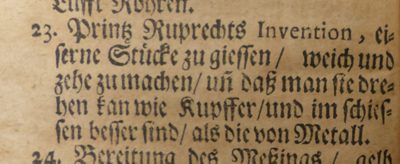Details can be found in Ludwig Beck's "Die Geschichte des Eisens" (The History of Iron). Prince Rupert was the son of Frederick V, Elector Palatine, and Elizabeth I of England. He was an English general and admiral, as well as "an outstanding chemist and physicist, and as such was in close contact with [Johann Joachim] Becher. [...] On 1 December 1670 he patented a process for [...] 'softening cast iron, so that it may be filed and wrought like forged iron' [...]" (p. 1274).
Back to Johann Joachim Becher's "Foolish Wisdom", where the author says about the Prince's invention: "Prince Rupert, however, […] instead of trying to harden iron into steel, made the iron soft and pliable so that it can be turned and can be made highly suitable for shooting […]. The prince has been granted a patent for this in England and is producing large amounts" (p. 34).
&crop=(7,0,585,937))
